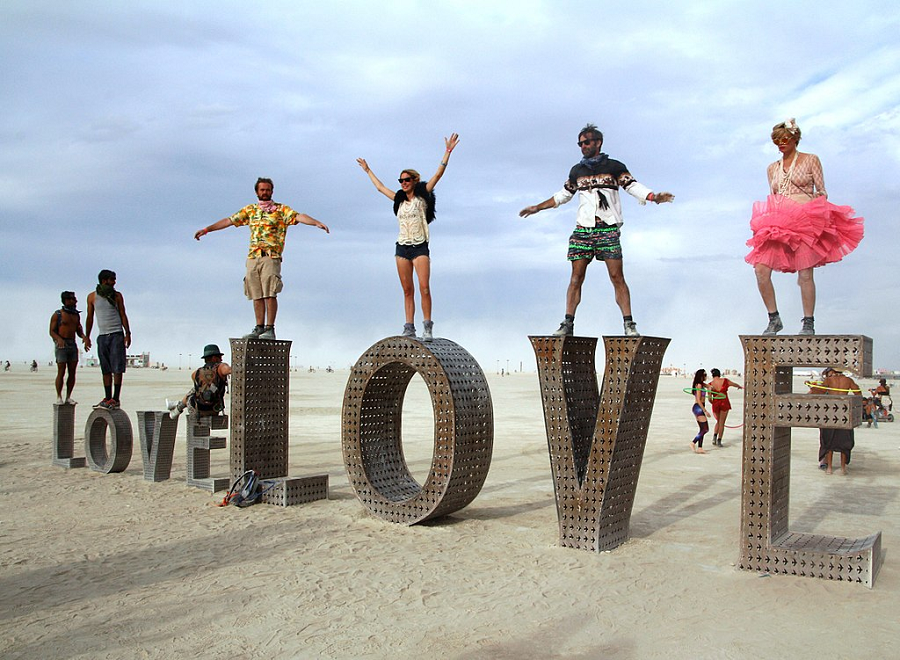6 Subculture and Group Membership
Module Learning Objectives (MLO)
In this chapter, you will
- MLO 6.1 Identify foundational concepts and theories related to subcultures, identity, appearance, and dress. [CLO 1]
- MLO 6.2 Identify the factors that influence different aspects of subcultural dress. [CLO 1]
- MLO 6.3 Explain the role of dress and appearance in identity development for different subcultures. [CLO 1]
- MLO 6.4 Examine how marginalized communities in the United States use dress and appearance to negotiate their identities. [CLO 2]
- MLO 6.5 Deconstruct your own perspective and approach to understanding the dress of subcultures. [CLO 4]
What Is a Subculture?
Subcultures are social groups, or groups of individuals who share similar lifestyles, belief systems, or other commonalities. Some subcultural groups have dress codes, whereas others do not. Sub means underneath or below; therefore, subculture refers to individuals who are a part of a group that is different from the dominant culture or dominant people in a particular part of society (Lennon, Johnson, & Rudd, 2017, p. 292).
Why Do Subcultures Exist?
Subcultures exist because the dominant culture does not meet the needs or interests of members of the particular subculture. Therefore, these groups form to engage in lifestyles or activities that meet the needs of their interests or shared experiences related to a particular identity (Lennon, Johnson, & Rudd, 2017, p. 292).
What are Examples of Subcultures?
There are numerous groups of people that could be classified as subcultures, for example: hippies, antigun groups, high school jocks, environmental activists, people in the furry community, people in the cosplay community;,punks, goths, and many more (Lennon, Johnson, & Rudd, 2017, 292). Even religious groups could be considered subcultures; for instance, Holdeman Mennonites are a group of individuals who follow a particular religion and wear a specific style (Church of God in Christ, Mennonite, 2021). All of these groups have shared interests, experiences, or identities, thus classifying them as a subcultures.
Social Groups
Individuals might identify with many types of social groups, which are defined by the connections between their members. These groups fall into two types: primary and secondary.
- Primary groups are small, informal collections of individuals who interact with each other in personal, direct, and intimate ways.
- Secondary groups are groups to which individuals feel only limited ties.
A subculture can be seen as a primary or secondary social group, depending on the type of culture and its members. Members of groups can be further categorized by their “closeness” and the extent to which they identify with their social group.
In-group membership
In-group memberships helps people feel
- Like they belong to the group
- A sense of togetherness
Out-group membership
In out-group membership, people
- feel like they do not belong to the group
- may make conscious decisions to avoid appearing out-group
For example, gangs are self-formed associations of peers with members who may engage in illegal activities. People may avoid being out-group members of a particular gang to escape violence and/or death.
Subculture membership
Some subcultural groups have clear, distinct rules and definitions of members (among these are some gangs, biker groups, and the Amish). However, many groups are only loosely defined, and members have liminal membership. For example, members of subcultures might
- relate to some people in the subculture but not fully invest identity in one group
- have moderate to limited connections with other members of the same group
- borrow style ideas from several groups.
Subcultures are Dependent on Context
Distinct Example: The Holdeman Mennonites
The Holdeman Mennonites live in communal groups that stay fairly separate from mainstream society.

Women’s dress is highly symbolic. Rules for acceptable prints (they change over time) are carefully approved by men and women in the community.
Liminal Example: Burning Man
The Burning Man festival began in the 1980s on Baker Beach in San Francisco but has become a large-scale, expensive event held in the Nevada desert for 2 weeks each summer.

The subculture community that forms each year is highly liminal and diverse.
Watch this short film Somewhere in Between on Burning Man, subcultural style, and shifting masculinities by Denise Green from Cornell University.
To access a transcript for the video above, download this file: Somewhere in Between Video Transcript [DOC]
Subcultural Style
Subcultures often develop or have distinct styles reflecting their membership. Mainstream culture might respond to this outward expression of a subculture in many ways, but a common process one sees n public response to subculture fashion is outlined below:
- Initial response is often fear,
- Dominant culture can meet the unmet needs,
- Dominant culture assimilates the subcultural style (commodification),
- Entrepreneurs commodify the style,
- After commodification, the subculture loses its initial power.
Example: Goth Subculture
In the 1970s, British bands set the tone for Goth subculture to emerge. Siouxsie and the Banshees are considered founders of the movement, and the group typified the subculture’s interest in dark, somber music. Over time, the Goth subculture was commodified and sold to a mainstream audience through stores like Hot Topic, which originally focused on selling music brands before expanding into a wider range of merchandise catering to a more vague Goth “aesthetic.”
This Siouxsie and the Banshees music video for the song “Spellbound” demonstrates the group’s dark, somber aesthetic.
To access a transcript for the video above, download this file: Sousie and the Banshees Spellbound Video Transcript [DOC]
Example: Punk subculture
Punk is difficult to define, due to its fluidity and complexity. The punk subculture, though, has roots in the 1970s in urban areas in the United States and the United Kingdom. Individuals who self-identify as punk typically reject aspects of mainstream society, including consumer lifestyles, politics, art, and ideologies. They frequently embody antihegemonic ideologies (Sklar, 2013).
Bricolage, or the creation from multiple and mixed things, is often described as central to punk aesthetics (Hebdige, 1979; Polhemus, 1994; Szatmary, 1996). Symbols often associated with punk aesthetics include , for instance, studded leather belts and cuffs, pins, ripped clothing, unnatural hair colors, combat boots, and many other dress and appearance practices (Bennett, 2006). Individuals mix and match multiple and varied items to create particular looks, a look influenced by the concept of bricolage. Plaids or tartans, and iconography such as band logos and subversive imagery are also patterns used frequently to signify group membership (Sklar, 2013). The popularization of tartan or plaid in the punk aesthetic dates to designers Vivienne Westwood and Malcolm McLaren (Punkflyer.com); the designers used the patterns in their early clothing lines in 1976 to signify those fighting battles or at war (Sklar, 2013). Another key concept in punk aesthetic is DIY, or do it yourself. Individuals may repurpose items or create original look through sewing, crafting, or other means (Sklar, 2013). Punk aesthetics also include distressed apparel. The notion of dirty or worn-in clothing rejects mainstream concepts of acceptable appearances, which aligns with some parts of punk ideologies.
It is important to note that there is no consistent look in a punk aesthetic for individuals who might self-identify as punk (Sklar, 2013). The media has perpetuated stereotypical images from early punk bands such as the Dead Kennedys, the Sex Pistols, and many others where band members wore garments such as leather pants, safety pins, and torn clothing. These early media representations helped define what the dominant culture or the public at large viewed and defined as definitively punk, punk aesthetics, and punk identities (Sklar, 2013). However, these media representations do not solely represent what embodying and expressing a punk identity means for everyone.
Motivations to embrace a punk style, aesthetic or identity are varied. In her book on punk style, Sklar interviewed an individual who explained that for him, punk is not expressed through his appearance but through his overall attitude. He said, “I’m older . . . so when I was a punk rocker, a lot of it was attitude. It wasn’t so much the clothing. We didn’t have Hot Topic, you know. There wasn’t anybody that was catering to a punk aesthetic like there is now . . . you know, it was a lot more, reflected personality a lot more I think back then” (2013, pp. 67–98). This example highlights how though sometimes we express our identities through our appearance, this is not always the case.
The evolution of punk from a subcultural community to a product commodified by high fashion is evident in the Metropolitan Museum of Art’s 2013 exhibition Punk: Chaos to Couture, which was mounted in 2013 (MET, 2021). In the exhibition, you can view individuals from the early punk movement, such as Paul Cook and John Lydon, members of the band the Sex Pistols and see how their styles and aesthetics influenced high fashion designers such as Martin Margiela, Gianni Versace, and Comme des Garçons.
The punk subculture and style began in the third quarter of the 20th century and continues into the 21st. Punk styles have transformed over time, yet core aspects of punk style include bricolage, appropriation, distress, DIY, subversive imagery, and/or rejections of mainstream society. These styles reflect the overall antisociety attitude that embodies punk identity.
Watch this short film on punk, punk identity, and dress.
Watch this short film on how subcultural style and roller derby.
References
Bennett A. (2006). Punk’s not dead: The continuing significance of punk rock for an older generation of fans. Sociology, 40(2): 219–235.
Hebdige, D. (1979). Subculture: The meaning of style. London: Routledge.
Lennon, S., Johnson, K. K. P., & Rudd, N. (2017). Social psychology of dress. London: Bloomsbury.
Polhemus, T. (1994). Street style: From sidewalk to catwalk. New York: Thames & Hudson.
Sklar, M. (2013). Punk style. London: Bloomsbury.
Szatmary D. (1996). A time to rock: A social history of rock ‘n’ roll. New York: Schirmer Books.

Subculture and Group Membership Case Study
Step One: Become familiar with the case study.
- The case study attached below is a Word document and can be downloaded. It includes the task, evaluation, and template for the case study:
Subculture and Group Membership Case Study [DOC]
Step Two: Submit your complete assignment on Canvas.
- Format your document.
- Remember to check the submission against the rubric.

